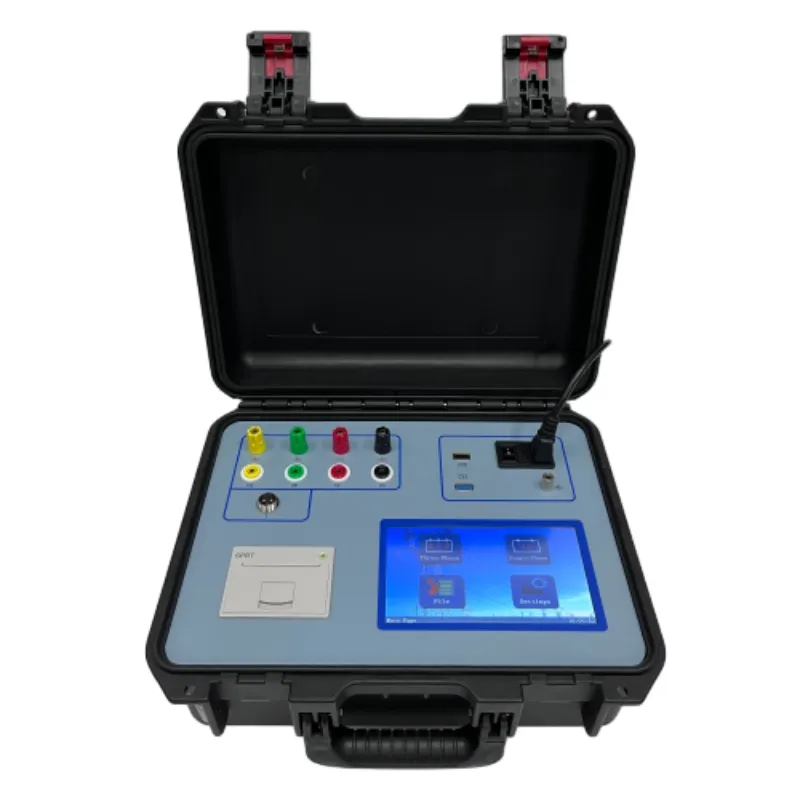TEL:
+86-0312-3189593
 English
English

Telephone:0312-3189593

Email:sales@oil-tester.com
2 月 . 20, 2025 10:29
Back to list
Single Cup Transformer Insulation Oil Breakdown Voltage Bdv Tester
Insulation testers, commonly used by electricians and engineers, are essential tools for assessing the integrity of electrical insulation. These devices not only prevent potential system failures but also ensure safety in environments where electrical reliability is critical. Selecting the right insulation tester involves understanding their functional capacities, applications, and how they contribute to the overall safety and efficiency of electrical systems.
Modern insulation testers often include features such as digital displays, rugged construction for fieldwork, and rechargeable batteries for sustained use. Advances in technology have also integrated data storage capabilities, allowing technicians to store test results for future reference and trend analysis. Such features elevate an insulation tester's usefulness from mere measurement to a comprehensive diagnostic tool, leveraging data-driven insights for better maintenance strategies. Manufacturers stand behind their insulation testers with certifications that attest to their accuracy and safety compliance. Certifications from recognized international standards bodies, such as IEC or ASTM, enhance an insulation tester’s credibility. These endorsements serve as a testament to the product’s quality, adherence to safety standards, and its potential effectiveness in a professional setting. When utilized correctly, insulation testers are instrumental in enforcing electrical safety protocols. They empower professionals with precise data essential for maintaining robust electrical systems. By mitigating risks associated with faulty insulation, businesses not only safeguard their personnel but also protect expensive equipment from damage, underscoring the importance of these devices in any comprehensive electrical maintenance toolkit. For an experienced electrician or engineer, an insulation tester is a tool of expertise that upholds operational standards and communicates a commitment to safety and reliability. It acts as both an identifier of existing issues and a preventive measure against future electrical failures. The investment in a quality insulation tester thus extends beyond simple compliance; it becomes a cornerstone of professional practice that secures workplace safety and preserves system integrity.


Modern insulation testers often include features such as digital displays, rugged construction for fieldwork, and rechargeable batteries for sustained use. Advances in technology have also integrated data storage capabilities, allowing technicians to store test results for future reference and trend analysis. Such features elevate an insulation tester's usefulness from mere measurement to a comprehensive diagnostic tool, leveraging data-driven insights for better maintenance strategies. Manufacturers stand behind their insulation testers with certifications that attest to their accuracy and safety compliance. Certifications from recognized international standards bodies, such as IEC or ASTM, enhance an insulation tester’s credibility. These endorsements serve as a testament to the product’s quality, adherence to safety standards, and its potential effectiveness in a professional setting. When utilized correctly, insulation testers are instrumental in enforcing electrical safety protocols. They empower professionals with precise data essential for maintaining robust electrical systems. By mitigating risks associated with faulty insulation, businesses not only safeguard their personnel but also protect expensive equipment from damage, underscoring the importance of these devices in any comprehensive electrical maintenance toolkit. For an experienced electrician or engineer, an insulation tester is a tool of expertise that upholds operational standards and communicates a commitment to safety and reliability. It acts as both an identifier of existing issues and a preventive measure against future electrical failures. The investment in a quality insulation tester thus extends beyond simple compliance; it becomes a cornerstone of professional practice that secures workplace safety and preserves system integrity.
Latest news
-
Differences between open cup flash point tester and closed cup flash point testerNewsOct.31,2024
-
The Reliable Load Tap ChangerNewsOct.23,2024
-
The Essential Guide to Hipot TestersNewsOct.23,2024
-
The Digital Insulation TesterNewsOct.23,2024
-
The Best Earth Loop Impedance Tester for SaleNewsOct.23,2024
-
Tan Delta Tester--The Essential Tool for Electrical Insulation TestingNewsOct.23,2024





